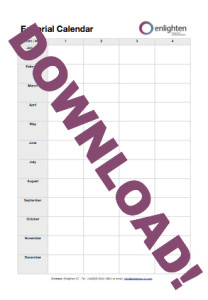
Is Planning The Key To Your Social Media?
By John Hogg
Tags:
Blog Enlighten ICHow staying organised and strategic can help send the right message
Social media is now a vital element of your marketing master plan. For excellent results it’s imperative that you are organised and strategic about the posts you publish in order to send the right message about your business to your audience.
There are so many examples out there of companies who haven’t thoroughly planned the posts they’re sending out and it has caused damage to the reputation of their company. Just have a look some of these blunders by international companies: http://on.mash.to/1irW9Yk
There are, of course, debates for and against strenuous planning of your social media content but in wider terms, being organised is generally a good idea. There’s the old adage from Benjamin Franklin "by failing to prepare, you are preparing to fail", which certainly rings true for certain scenarios. But what about in the social media space? Below we’ll dip into just some of the pro’s and cons of planning social media and some suggestions on how to approach it.
Benefits of planning your social media...
Organisation: this point goes without saying, planning in advance will allow you to manage your time more effectively and enable you to focus on more pressing business matters. How many times have you had to juggle deadlines and thought - I wish I’d planned this beforehand so I know what I’m doing!? If you plan ahead, this hopefully won’t happen!
Creative Planning: this may seem apparent, but if you plan ahead, you’ll be less likely to suffer from a creativity stump. Often if you’re told you have to post something urgently (say within the next half an hour) you’ll be stumped and suffer from dreaded ‘writers block’ and end up posting something half-assed and irrelevant.
Reducing pressure: a big pro of planning your posts is that it can reduce your stress levels if you know you have a topic in mind before sitting down to write. This is a much better feeling than just staring at a blank computer screen with no idea where to start and what to write.
Researching: planning your posts will enable you to properly research and take inspiration from other sources. This extra time spent researching will enable you to make your posts as interesting and as valuable as possible. It will also allow you to tailor your posts so that your calls to action are as engaging as possible.
Setting themes: planning will allow you to develop themes for your scheduled posts. Tailoring your messages to a specific theme will show the reader your knowledge and expertise of the topic and that you're not just throwing something together for the sake of it.
Setting the tone: organising your posts in advance will allow you to enhance the readability of your content. You will be able to consider the tone you want to set. I.E. - Are you a young vibrant company who can afford to be a little more ‘out there’ with your content or are you a strictly professional company who need to project a serious image?
Media collation: planning ahead will allow you to scour the internet for images, videos or websites that will complement your posts avoiding the last minute scramble for a ‘that’ll do’ image.
Optimisation: by planning in advance you'll be able to spend some time optimising your posts. You'll be able to spend time researching keywords which when inserted into your content will help improve your SEO and search-ablility.
The limitations of planning too much...
Rigidity: planning in advance and agreeing to a structured schedule might seem like you have to stick to the exact timetable. Having something ‘set in stone’ could make you feel like you are bound to it and to go off on a tangent would upset the strategy you have in place. You could be missing out by being fearful of a spontaneous post. Always remain open-minded about your content strategy.
Stifled creativity: if you’ve already planned your posts and agreed them with your peers you may feel like you’re unable to demonstrate your creative flare as you’re restricted to a certain theme and tone. If you have more ideas, discuss them with your peers. Don't just let it go!
Time consuming: a good schedule will undoubtedly take time and effort to construct. While it's great to put thought into your content, be careful not to spend too much time over engineering. You could run the risk of ignoring other important business matters.
Irrelevancy: your posts could become obsolete if you’ve planned too far in advance. You may wish to publish a post about the latest wearable piece of technology (a favourite topic of ours :)) in 6 months time and constructed a blog piece to complement your post but who knows, the item could have been replaced 3 weeks before you go and publish your content, meaning you’ve wasted valuable time which could have been spent on more pressing matters. Once again, remain open-minded!
Your social media schedule
So, we’ve looked at a few advantages and disadvantages along with the reasons behind them, but what about actually putting a schedule in place?
A popular way to scope and schedule your posts is using an ‘editorial calendar’. There are loads of different examples available online which you can use plan your social media content - a quick Google search will bring you loads of results.
You will be able to format the calendar to your specific requirements and make it as long or as short as you like. It will also depend on the number of contributors to your posts. Will one person be managing your social media content or a team of people? For a larger team a web based calendar would probably be more efficient as you can all access it simultaneously. For a smaller company who are simply wanting to outline their topics and posts, without any fuss or hassle, the most easy and convenient way is to use a spreadsheet or the calendar feature available on your pc or mac.
Here’s one we made earlier:
 ← feel free to download this and use it as a starter calendar for your content schedules. All we ask is that you leave us a comment below on you you intend to use it! [NO LONGER AVAILABLE]
← feel free to download this and use it as a starter calendar for your content schedules. All we ask is that you leave us a comment below on you you intend to use it! [NO LONGER AVAILABLE]
Once you’ve nailed your editorial calendar, you can take advantage of web based schedulers like Hootsuite and Buffer which will post directly to your wall. Facebook also has it’s own individual scheduler where you can log in and select the time and date you want your post to appear which is handy if you’re away on holiday or out of the office.
Regardless, if you want to plan for a week or a year in advance, your social media posts should be thought of as micro marketing messages so it’s best that careful consideration is given to each post. Prior planning is the key to organising your posts so that you get the best return for the time invested. You want your content to mean something to your audience and most importantly you want them to value your knowledge and expertise.
Don’t be scared to go a little off tangent and be flexible from time to time. If there is a particular topic in the news that is relevant to your business and will be beneficial for both you and your audience, go ahead and write about it. Don’t forget to blow your own trumpet, if you’ve unexpectedly won an award or been nominated for something you should definitely post about it... (but beware of the temptation to humblebrag!).
We’d love to hear about how you scope and schedule your social media posts. Give us a shout below and let us know!
If, of course, you don’t have time to manage your social media in house, Enlighten IC would be happy to step in and assist you in any way we can. Give us a call or email us and we’d be delighted to share our social media success stories with you.
So there you go, there are quite a few pro's and con's to planning your social media content. On balance, however, we feel that it always pays to plan your content calendar up front, whilst remaining open-minded along the way. Good luck and let us know about some of your experiences with planning your social media content.
photo credit: photosteve101 via photopincc

John Hogg
John is managing director of Enlighten IC and has been involved in legal marketing and technology marketing for over 25 years. He is passionate about how an inbound approach to marketing can help firms to drive leads and grow their business.
Get In Touch

